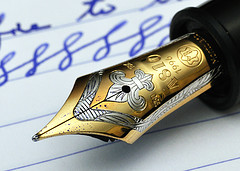
Our Week-in-Review feature has a new format. We know there’s way too much to read out there already, so we’re going to be highlighting the top five articles, books, websites, etc., that we’ve been reading or thinking about the past week. If you have items you’d like us to consider for the top five, add them in the comments or send them to Tom or Mike.
A Better Pencil – Inside Higher Ed interviews Dennis Baron, author of A Better Pencil: Readers, Writers, and the Digital Revolution. It’s a history of writing implements in the digital age, and Barron provides some insights into how our media affect our messages. For example, in his class on the history of writing, he sometimes uses an exercise in which his students have to write on modeling clay – very old-school.
Photo credit: 2careless via Flickr
One indisputable sign of that postmodern Stalinism is the revival of the idea of the great Russian nation, which Stalin had recognized as the most important achievement of the czars. “The Russian czars did a great deal that was bad,” Stalin noted at a famous toast on November 7, 1937, at the height of the terror. “But they did one thing that was good —they amassed an enormous state,” he went on. “We have inherited that state.” — Postmodern Stalinism: Revisionist histories help revive his reputation in Russia (Jonathan Brent, Chronicle of Higher Education, 9/21/2009).
According to John F. Burness, Study Abroad Is Often Not All It Should Be (Chronicle of Higher Education, 9/21/2009). Have you taken advantage of the surge in studying/teaching in other countries? If so, how have you found it to be of educational value and on what grounds would you recommend it to the next generation of scholars?
How have you responded to the controversy raised by The seven deadly sins of the academy (Matthew Reisz, Times Higher Education, 9/17/2009)? Tom found the editor’s comment, in which Ann Mroz highlights that she is a woman and a feminist with a sense of humour who supports academic freedom and the right to free speech, perplexing. How do you have conversation about the seven deadly sins without a shared moral framework? Is it just a shouting match, even the part about being open?
Terence Kealey was asked to write on the theme of “the seven deadly sins of academe”. He was explicitly asked for a “lighthearted” or “wry” piece, and we suggested the topic of “lust”, which was a “sin” identified by a straw poll of academics; it was not Dr Kealey’s own suggested topic. Dr Kealey’s article was satire. I fully support his right to express himself in this way. If people are offended, that is their right and they also have the right to express that.
If we cannot have freedom of speech and robust debate in the academy where can we have it?
Nine Famous Workspaces – The personal productivity website Lifehacker has been focusing on workspaces all week, and this post shows off workspaces of some famously productive people: Al Gore, Bill Gates, Steve Jobs, and so on. No academic workspaces are included in this post, unfortunately, but it’s still an interesting peek at others’ working lives.
Bonus: Don’t forget to order your copy of George Marsden’s Outrageous Idea of Christian Scholarship (Amazon, Abebooks, B&N, WorldCat). We’ll be discussing it in October for our 2nd ESN Book Club.
The former Associate Director for the Emerging Scholars Network, Micheal lives in Cincinnati with his wife and three children and works as a web manager for a national storage and organization company. He writes about work, vocation, and finding meaning in what you do at No Small Actors.

Leave a Reply